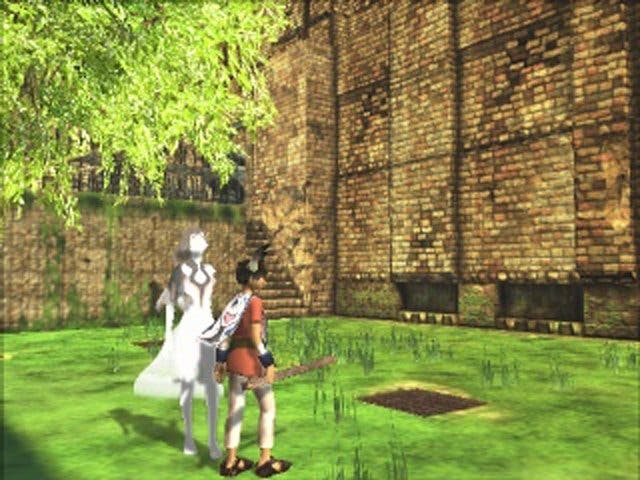Eurogamer Editors' Games of the Decade
Six of our Top Men (and a lady) pick a game they love and explain.
Tom Bramwell (Editor, 2008-present day) - ICO
When we first decided to do these blogs - around a thousand words each on one of our favourite games released during Eurogamer's 10 years of life, in case you haven't caught the drift - I told everyone that I didn't think we should write retrospectives. We do those already on Sundays, I like them where they are, and I don't want to rule out any of our anniversary faves for Retro treatment in the future.
Instead, I suggested we talk about why each game was special for us as individuals, then and now, hoping that in the process we would each reflect and delve into the spirit of the website in earlier days, not only saluting the games but exploring ourselves a little in the process. The practical upshot of this, I realise now, is that we'll probably find out Unreal Tournament was actually rubbish and Deus Ex was a poor man's Fruit Mystery, but hey, making catastrophic errors and then owning them is a bit Eurogamery anyway! On with the show.
Or, sort of not. Unfortunately, it turns out that I've already been down this road for my chosen game, ICO. Three years ago I re-reviewed it for its re-release alongside Shadow of the Colossus, screaming childishly, ludicrously, self-indulgently about its qualities, imploring people to buy it. Even now, what I wrote there captures a lot of what meant so much to me at the time.

Meant so much to me, though. I can't relate to my younger self. Appointing the velvet-lined white coat of an existential alchemist to my shoulders for a second, I suspect it's because I'm older, colder, and - judging by my recent tendency to write as though I'm pitching for a tweed jacket - more or less incapable of escapism, merely of basking in other people's design skills. With Portal, for example, I enjoyed playing it with the developer commentary and discovering how Valve moves your eyes around a room or teaches you to solve puzzles more than I enjoyed the game itself. This was a triumph? This was beyond the veil.
Of course, there are things I like about ICO as much now as I did then. Top of the list is the soundtrack, which is so tender, so personal, and so irritatingly catchy that I still whistle the save-game music once every few weeks. But interestingly, second on the list is probably the visuals.
ICO is a PS2 game, so by definition it's like bathing your eyeballs in hot sauce and then scraping them across a cattle grid, but really, whenever I catch a glimpse of one of the long sight-lines to the coast, or look out over the sea, it's enough to give me pause, even in the same week I bought a new PC that can run Crysis at full whack and regards Unreal Engine 3 as a Flash app. Unlike so many games since, ICO is beautiful in spite of its technology, not because of it.
But I digress. What's lovely to discover about ICO is that like the very best music, film and - dare I use the word - art, I find myself admiring it for new reasons now that a few more years have passed. It works differently on me. Once it was the tender relationship between Ico the boy and Yorda, the economy of animation and voice work that overcame the deliberate decision to make it impossible for the two to communicate, and the vast, isolating magnitude of the characters' imprisonment. I lost myself there. Coupled to that I had a marvellous puzzle game. Not everything worked intuitively, but I could forgive the confusion at the windmill and accidentally leaving Yorda behind at the lagoon beneath the artificial waterfall in context of the rest.

And it's other things now that mean so much to me. It's the geometric precision of the castle, in particular, that holds me to its hazy, wistful bosom and whispers calming sentiments; the absolute clarity of routing and puzzle navigation across those four hours, almost never confusing the player or breaking its own rules, even though its rules, and even Ico's objectives, are never spoken.
For all that it's presumably meant as a kind of paean to hope in the face of abandonment and uncertainty, it's the crushing, geophysical certainty of the game's construction - from the broadest strokes of the East Arena to the simplest block-and-switch puzzle - that keep me going and, more importantly, that keep me company. Never mind innocent little Yorda - where once I had turned off pad vibration because I felt like I was yanking her arm too hard, this time I wouldn't even wait for her to walk five feet without wrenching her onward toward the next brainteaser. How about a handcuff patch so I can drag her up ladders too? It's probably a bit late for that now, but you know, one for The Last Guardian perhaps? That's basically ICO with a flying cat-Yorda, isn't it?
You know, I'm forever blathering nonsense on this website (thanks for your support, by the way) about whether a developer was seeking to upset the essential gravitational morality of a particular genre with the jaunty angle of the third goblin from the left's hat, and all sorts of other gibberish, but ICO reminds me that games are sometimes incredibly complex despite being amazingly simple. Playing it in 2009 is like taking my socks off and splashing cold water on my face after a long day in the sun.
I can't wait to play it again in a few years and see what else I like about it. Assuming I last that long, I'll let you know.
